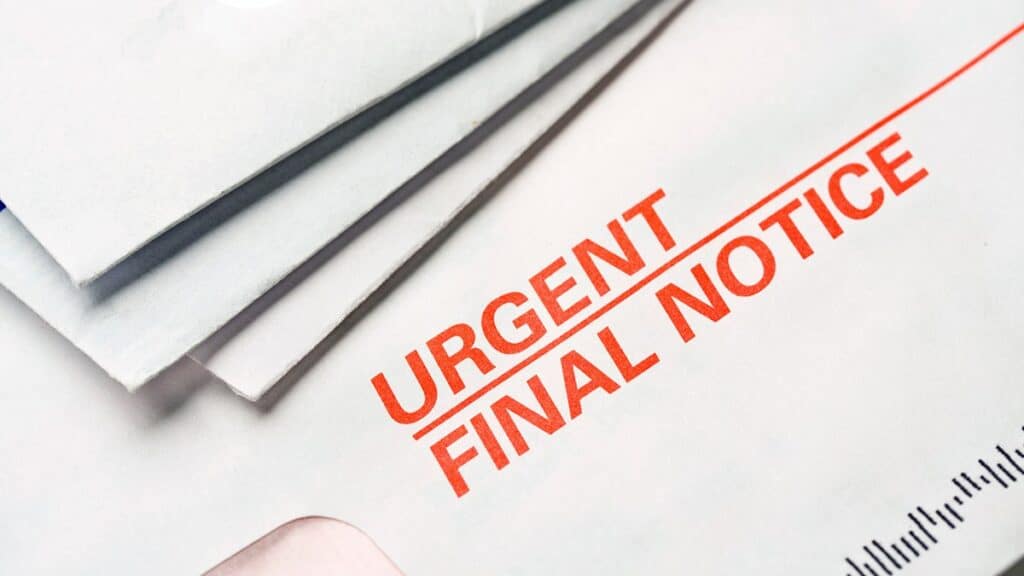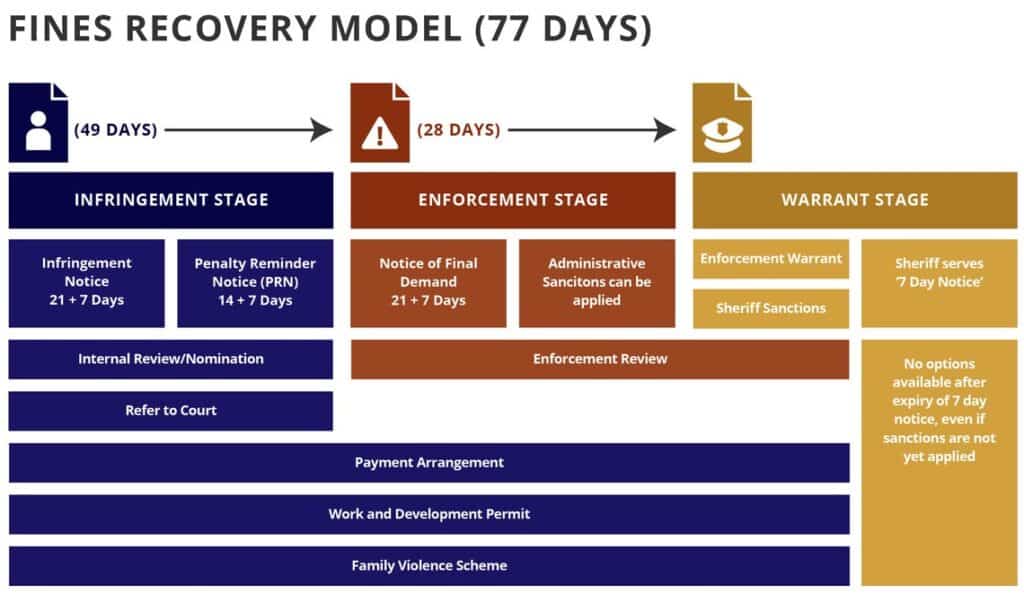Infringements, Unpaid Fines & Infringement Lawyers
The infringements (or fines) process in Victoria is complex. It has multiple steps, from issuing an infringement to the enforcement and warrant stage, in which a Sheriff can seize and sell personal property to recover outstanding infringements or unpaid fines.
If you have outstanding infringements or fines, we can assist you. The options available to you will depend on what stage of the infringement lifecycle you are at. If you have recently incurred an infringement or have just become aware of it, please contact our office as soon as possible for an appointment with an infringement and fines lawyer. Like most legal issues, the ability to contest a fine or nominate another driver (for a driving offence) is time-sensitive and requires action as soon as possible.
If you have fines that have remained unpaid for several years, don’t worry; we can still help. If an Enforcement Warrant has been executed or you have been arrested and bailed to appear in court, our lawyers can prepare your case and represent you. On many occasions, our lawyers have reduced our client’s debt significantly and, in certain circumstances, discharged the debt completely, saving our clients thousands of dollars. See ‘What is an Enforcement Warrant‘ for more.

Unpaid toll fines

Do fines go away after 7 years?

Applying for an enforcement review

Sheriffs and Fines Enforcement

Enforcement Orders (for court fines)

Applying for a discharge
We have offices in Melbourne CBD, Dandenong, Geelong, Ballarat, Ringwood, Frankston and Moorabbin. We regularly appear at the local Magistrates’ Courts around Melbourne, representing clients being pursued by the sheriff in relation to debt that can range from $1,000 to $300,000 and is usually made up of over-inflated administrative late fees associated with using toll roads.
Please read on for more on the fines recovery process and your options if you have outstanding fines.
The Victorian Infringement System
The government and enforcement agencies use infringement penalties (or fines) to deal with minor criminal and traffic offences. In Victoria, hundreds of offences can be dealt with by infringement. While Victoria Police and local councils issue most infringements, many authorities have the power to issue infringements in Victoria.
The Fines Reform Bill 2014 overhauled Victoria’s previous fine system, creating Fines Victoria as a centralised contact point for infringements. Under the current system, the Director of Fines Victoria provides for the collection and enforcement of all infringement fines and court fines. The enforcement of infringements in Victoria is regulated by the Fines Reform Act 2014 (FRA) and the Infringements Act 2006.
Infringement notices versus court fines
It is important to distinguish infringement notices from court-imposed fines that occur when a person is sentenced to pay a fine under the Sentencing Act 1991 (Vic) if they have been found guilty of an offence. While the process and options available for dealing with court fines differ from infringements, it is common for people to present with a combination of infringements, enforcement warrants and court fines.

Relevant Legislation
Victoria’s infringement system is provided by the following legislation:
- Fines Reform Act 2014 (Vic): Establishes Fines Victoria to administer fines and grants power to the director of Fines Victoria to collect unpaid fines.
- Infringements Act 2006 (Vic): Establishes a framework for enforcement agencies to issue infringement notices. It also gives recipients of notices the right to seek an internal review.
- Sheriff Act 2009 (Vic): Outlines the Sheriff of Victoria’s powers and responsibilities, including the power to execute a warrant following the non-payment of a fine.
- Road Safety Act 1986 (Vic): Has provisions related to road safety offending and infringements.
The Fines Recovery Process
The Victorian infringement system is complex, with multiple steps, from the issuing of an infringement notice to the enforcement warrant stage. When an infringement notice is issued to a person, they usually have 21 days to either pay the fine, request a review or nominate a responsible driver (for traffic offences). At the end of the infringement notice and reminder period, if a person (the debtor) takes not action, the infringement will progress to the enforcement and warrant stages.
At the expiration of the notice of final demand stage, the director of Fines Victoria may impose administrative sanctions, including:
- driver and motor vehicle sanctions such as licence registration suspension and number plate removal
- making an attachment of earnings direction, which allows creditors to take money directly from a debtor’s income (see Fines Reform Act 2014 Part 7, Division 1 and Division 2 and the Fines Reform Act Regulations 2017 s 18)
- making an attachment of debts direction, which allows recovery of money from a third party
- declaring a company director personally liable for company fines
- making a production of information direction, which is an order that requires the debtor to provide a statement of their financial circumstances or attend oral examinations (Fines Reform Act 2014 ss 59 – 64)
- applying to the Registrar of Titles for a charge to be placed over land that the person who owes money under an infringement warrant owns or co-owns (see Fines Reform Act 2014 Part 9).
- immobilise and detain the debtor’s motor vehicle/s
- seize and sell the debtor’s property
- arrest the debtor.
The table below sets out the infringement lifecycle in Victoria.

Social justice initiatives
The infringement model in Victoria allows certain concessions for those who may be unable to pay a fine. Before the expiry of the 7-day notice served by the Sheriff’s Office, an eligible person can apply for:
- a Work and Development Permit, which provides a non-financial means for vulnerable parties to deal with infringements; or
- fines to be withdrawn under the Family Violence Scheme, which applies in circumstances where family violence substantially contributed to the offence, or it is unsafe for the debtor to name the person responsible for the infringement.
The Time Served Scheme is another initiative in which prisoners can apply to have outstanding fines registered with Fines Victoria to be converted to run concurrently with a sentence of imprisonment. This is known as ‘calling in’ your fine. Fines resolved through the Time Served Scheme occur at the rate of one penalty unit per day in prison.
What are the options if you have outstanding fines?
Option 1 – Contest the matter in court
If your fine is at the Infringement Notice or Penalty Reminder Notice stage, you can apply to have your matter heard in the Magistrates’ Court or Children’s Court if you are under 18 (s 16 Infringements Act 2006). If your matter relates to excessive speeding or drug/drink driving, you must submit a Notice of Objection within 28 days and before your licence is suspended (details of this are found on your infringement notice).
If your application is accepted, your matter will be referred to the Magistrates Court, and you will receive a charge sheet and summons to appear in court at a later date. If the offence attracts a licence suspension/disqualification, this will be put on hold until the outcome of your court case.
It is very important to seek advice from a lawyer before electing to have your matter dealt with by a court, as in some circumstances, you may be worse off choosing this option. For example, for offences where a licence loss is mandatory, and there is no defence to the charge, you could risk a conviction being recorded, a more extended licence loss and a higher penalty.
Option 2 – Nominate another driver (driving offences)
If you have received an infringement notice for a driving offence where you were not in possession or control of the vehicle, you can nominate the person who was driving. There are strict timelines for nominating a driver, and this must occur at the Infringement Notice or Penalty Reminder Notice stage, which is usually within 28 days (before a conviction is recorded and any licence loss is imposed).
If your fine is at the Notice of Final Demand or Enforcement Warrant stage, it is unfortunately too late to nominate another driver. However, if you only found out about the fine within the last 14 days, you can apply to the Magistrates’ Court for an extension to nominate a driver. See s 67 and s 89BA (for excessive speed infringements) of the Road Safety Act 1986.
We regularly appear in court for clients in relation to these types of applications.
Option 3 – Internal Review
You may seek an internal review if your fine is at an Infringement Notice or Penalty Notice stage. You are only able to seek one internal review for each infringement.
You can seek an internal review on any of the following grounds:
- Person unaware (you did not know about the fine)
- Contrary to the law (the fine is invalid or not issued properly)
- Mistake of identity (the fine was issued to the wrong person)
- Exceptional circumstances (the offence occurred as a result of an unavoidable or extraordinary situation)
- Special circumstances (mental or intellectual disability, drug/alcohol addiction, homelessness or family violence). Note the Family Violence Scheme is an option if there is a nexus between the fine and Family Violence.
The agency that issued the fine will decide on the internal review within 90 days of receiving the application. Many outcomes can follow an internal review, including:
- Withdrawal of the fine
- Withdrawal of the fine and issuing of an official warning
- Referring the matter to court
- Waiving fees associated with the fine
- Allowing a payment plan
- Confirming the original fine is appropriate in all of the circumstances.
An internal review is not available for drug/drink driving/boating offences, excessive speeding or court-issued fines.
Option 4 – Payment plan or pay by instalments
If you are unable to pay your fines in full, you can request a payment plan and pay in instalments (see s 42-58 of the Fines Reform Act 2014). Your application will be assessed based on your income, payment history, how much the fine is and any hardship that you may be facing. There are certain circumstances where you are not able to request a payment plan, such as if you have received a 7-day notice that has expired or you have waived the 7-day period.
Option 5 – Enforcement Review
This option is available when a fine or fines have reached the Notice of Final Demand stage. The relevant legislation is in sections 31-41 of the Fines Reform Act 2014. Like an internal review, you can only seek an enforcement review on the following grounds:
- Person unaware – you did not know about the fine.
- This does not apply to traffic offences, tolling offences or Environmental Protection Agency or littering offences involving a vehicle or an offence issued by Victorian Police.
- If the offence is a traffic or tolling offence, an application can be made to the Magistrates’ Court for an extension of time to nominate (so long as the application is made within 14 days of becoming aware of the fine).
- Contrary to the law – the fine is invalid or was not issued properly.
- Mistake of identity – the fine was issued to the wrong person.
- Exceptional circumstances – the offence occurred as a result of an unavoidable or extraordinary situation.
- Special circumstances (mental or intellectual disability, drug/alcohol addiction, homelessness or family violence). Note that the Family Violence Scheme is an option where there is a nexus between the fine and Family Violence.
If your application is successful, the fine will be referred back to the enforcement agency, where the following can occur:
- The fine can be withdrawn;
- The agency can issue you with a warning and withdraw the fine;
- The agency can serve you with a summons and charge to appear at Magistrates’ Court;
- The agency can issue a new fine (if you applied on the grounds of ‘person unaware’).
An application must be considered carefully and with sufficient and relevant evidence to support the grounds for review. You only get one opportunity to apply for an enforcement review (unless you are eligible to apply for a special circumstances application).
See ‘Applying for an Enforcement Review‘ for more on seeking an enforcement review.
Option 6 – Application under the Family Violence Scheme
The Family Violence scheme allows victims of family violence to apply to have their fines withdrawn without having to go to court or having a finding of guilt against their name. If the application is successful, it will also mean demerit points will be avoided. The application process requires a statutory declaration to be prepared along with at least one other piece of relevant evidence.
For operator onus offences (driving offences where the applicant was not the driver) and in circumstances where it is safe to nominate who was driving the vehicle, the applicant can request the Director to suspend enforcement action. If the application succeeds, the applicant is given 6 months to nominate. If it is not safe to nominate, then the fine can be withdrawn entirely by the enforcement agency.
An application must be made before:
- The expiry of a 7-day notice;
- An attachment of earnings direction or attachment of debts direction has been made;
- A land charge has been recorded;
- Property has been seized under a vehicle seizure and sale notice; or
- The fine has been paid.
The scheme is available for most infringements if it can be demonstrated that the person is a victim of family violence which substantially contributed to:
- Incurring infringements; or
- Being unable to nominate a driver due to family violence (in operator onus offences).
An application must be made before:
- The expiry of a 7-day notice;
- An attachment of earnings direction or attachment of debts direction has been made;
- A land charge being recorded;
- Property being seized under a vehicle seizure and sale notice; or
- The fine being paid.
The Family Violence scheme does not apply to:
- Court issued fines;
- Fines issued by companies;
- Fines against local councils (other than parking fines); or
- Drink driving, drug driving, excessive speed, drink/drug boating offences, rail safety offences.
Option 7 – Work and Development Permit
A work and development permit allows vulnerable people who are suffering from significant financial hardship, homelessness, drug/alcohol abuse, family violence or an intellectual disability the option to “work off” fines through completing activities and attending approved counselling/ mentoring services.
This option is only available until a 7-day notice expires. If a person has been arrested, property has been seized in relation to the fine, or the fine is a court fine, then this option is not available.
Activities that you can undertake include the following:
- Unpaid work;
- Treatment given by a nurse, doctor or psychologist;
- Completing courses (educational, vocational, or life skills);
- Attending counselling (including financial counselling);
- Mentoring (person’s under 25 years of age).
The Work and Development Permit scheme is established under Part 2A of the Fines Reform Act 2014. The guidelines are made by the Attorney-General under s 10L of the act.
Eligibility for a work and development permit
To be eligible for a work and development permit, you must have an existing relationship with an approved sponsor, and the sponsor must apply for a permit on the person’s behalf. If you are already engaged in treatment with an organisation willing and able to become a sponsor, you can contact the work and development team about becoming a sponsor. See contact details on the Fines Victoria website.
Option 8 – Arrest and Bail by the Sheriff
This is a last resort option, which occurs after the expiry of a 7-day notice period. If the debt remains unpaid at the expiry of the 7 day notice period, the Sheriff officers will take action to execute the enforcement warrant by seizing and selling property or arresting you so that you are brought before the court. VicRoads may also be directed to suspend or cancel your licence or registration.
If the sheriff cannot recover the debt, you will be arrested and bailed to appear at the Magistrates’ Court under s 165 of the Fines Reform Act 2014. This is the most common enforcement option for people who have limited property. When a person is referred to court for unpaid fines, this is commonly called a “Section 165 Application“. At this stage, it may also be possible to undertake community work, and the sheriff may offer this if the infringements are less than 100 penalty units.
See ‘Execution of enforcement warrants‘ for more about what happens if you take no action in relation to an unpaid fine after the 7-day notice period served by the Sheriff has expired.
What is a Section 165 Application?
A section 165 application occurs once a sheriff has arrested and bailed a person unable to repay the debt of their outstanding infringements. The bail agreement will provide a date and time (for the debtor to appear at the Magistrates’ Court for a hearing (a s 165 application).
Section 164(1) specifies that a person must be brought before the Magistrates’ Court within 24 hours after being arrested; however, s 164(2) states that a later day may be fixed if it is not practicable to bring a person before the court within a 24-hour time frame.
A Magistrate will consider the criteria under s 165(2) of the Fines Reform Act:
- Whether the person has a mental illness, intellectual disability or impairment;
- Whether there are special circumstances;
- Whether imprisonment would be excessive, disproportionate, or unduly harsh; or
- Whether the person is a victim of family violence which substantially contributed to the offending.
If a Magistrate is satisfied of any of the matters in s 165(2) the Magistrate may:
- Discharge in full any outstanding fine;
- Discharge in part. If the amount is discharged in part, the court can make an instalment order for the balance (see s 165A(1));
- Discharge in part and order imprisonment. It can also be subject to an instalment order with a warrant to imprison in default, namely an ‘imprisonment in lieu order’ or “IIL” (see s 165A(2));
- Make a fine default unpaid community work order; or
- Adjourn the hearing for up to 6 months.
If a Magistrate is not satisfied of any matters in s 165(2) they may under s 165(3):
- Make a fine default unpaid community work order;
- Make a time to pay order;
- Make an instalment order;
- Adjourn for 6 months on any terms they think fit; or
- Order imprisonment:
- which can also be subject to an instalment order with a warrant to imprison in default (s 165A(2))
- the maximum period of imprisonment is 24 months/ 1 day for each penalty unit or part of the penalty unit remaining unpaid (s 165B).
Imprisonment – limitations of the court
Under s 165(4), the court must not make an order for imprisonment (directly or by default of payment plan) if the court is satisfied that the offender:
- Did not have the capacity to pay for the outstanding fine; or
- Had another reasonable excuse for non-payment.
Under s 165(5), the court must not make an order for imprisonment unless it is satisfied that no other order is appropriate in all of the circumstances of the case.
The maximum term of imprisonment that can be imposed is 24 months (s 165B).
What are the risks following a s 165 application?
If the court has placed you on a payment instalment plan with a warrant to imprison in default, it means that if you do not strictly comply with the court order, a warrant to imprison will be issued, and you will be required to serve a term of imprisonment in lieu.
Warrants to imprison in default of payment plan
As mentioned, if you have received a warrant to imprison and have not complied with your court-ordered payment plan, you will be required to serve a jail term. If you believe you are going to default on paying off your fine (as ordered by the court), we advise that you call us as soon as possible, as the best option is usually to seek an application to vary the instalment order (allowing more time to make payment) (see the FRA s 166).
Other options:
- Applying for a rehearing – s 167 of the Fines Reform Act 2014
- Applying to the court to have the warrant recalled and cancelled – s 58 of the Magistrates Court Act 1989 (Vic)
- Applying for Judicial Review – order 56 of the Supreme Court (General Civil Procedure) Rules 2005 (Vic).
See also ‘options to avoid imprisonment‘ under an enforcement warrant.
Attachment of earnings and debt directions
An attachment of an earnings direction enables Fines Victoria to recover the debt by allowing money to be taken directly from the debtor’s income (such as from the employer). On the other hand, an attachment of debt direction allows Fines Victoria to recover money from a third party who owes the debtor money.
If the amounts of a registered infringement are at least $1000, the Director of Fines Victoria can make an attachment of earnings direction. An attachment of debts direction can be made if the amount is at least $100. (See FRA ss 65(1) and 78(1) and the Fines Reform Regulations 2017 regs 5 and 6). This can occur even without a 7-day notice.
The Director of Fines Victoria can make an attachment of earnings or debts direction in respect of a fine defaulter if:
- the amount outstanding under the enforcement warrant is at least $1000 for an attachment of earnings direction or $100 for an attachment of debts direction;
- a notice of final demand has been served (which has not been complied with);
- the fine has been registered or a collection and enforcement order has been registered; and
- an application for a payment arrangement or enforcement review has not been made.
An attachment direction can, therefore, be made before the issue of an enforcement warrant (after service of the notice of final demand if it is unpaid) (per the definition of ‘fine defaulter’ under FRA s 3(1)). When an attachment direction has been made, options to apply for enforcement review, a work and development permit or make a family violence application are no longer available (FRA ss 32(4), 10B(2) and 100). An application can be made to vary, cancel or suspect a direction under ss 70 and 84 of the FRA.
Calling in fines while serving a term of imprisonment
If a person is serving a sentence of imprisonment, it is possible to “call in fines” under the Time Served Scheme. In most circumstances, the sentence of imprisonment for the outstanding fine/s can be served concurrently with any other sentence that person is serving (meaning no additional time inside). An application must be made while a person is in prison under s 171AA (a)(i) of the Fines Reform Act 2014.
If a person has been released from prison due to their charges being withdrawn, time being served, or not being sentenced to imprisonment, they will have 6 months from their release date to apply to the Time Served Scheme.
It is always important to seek advice before calling in fines, particularly if you have just been released from custody, to ensure you are not at risk of additional prison time.


